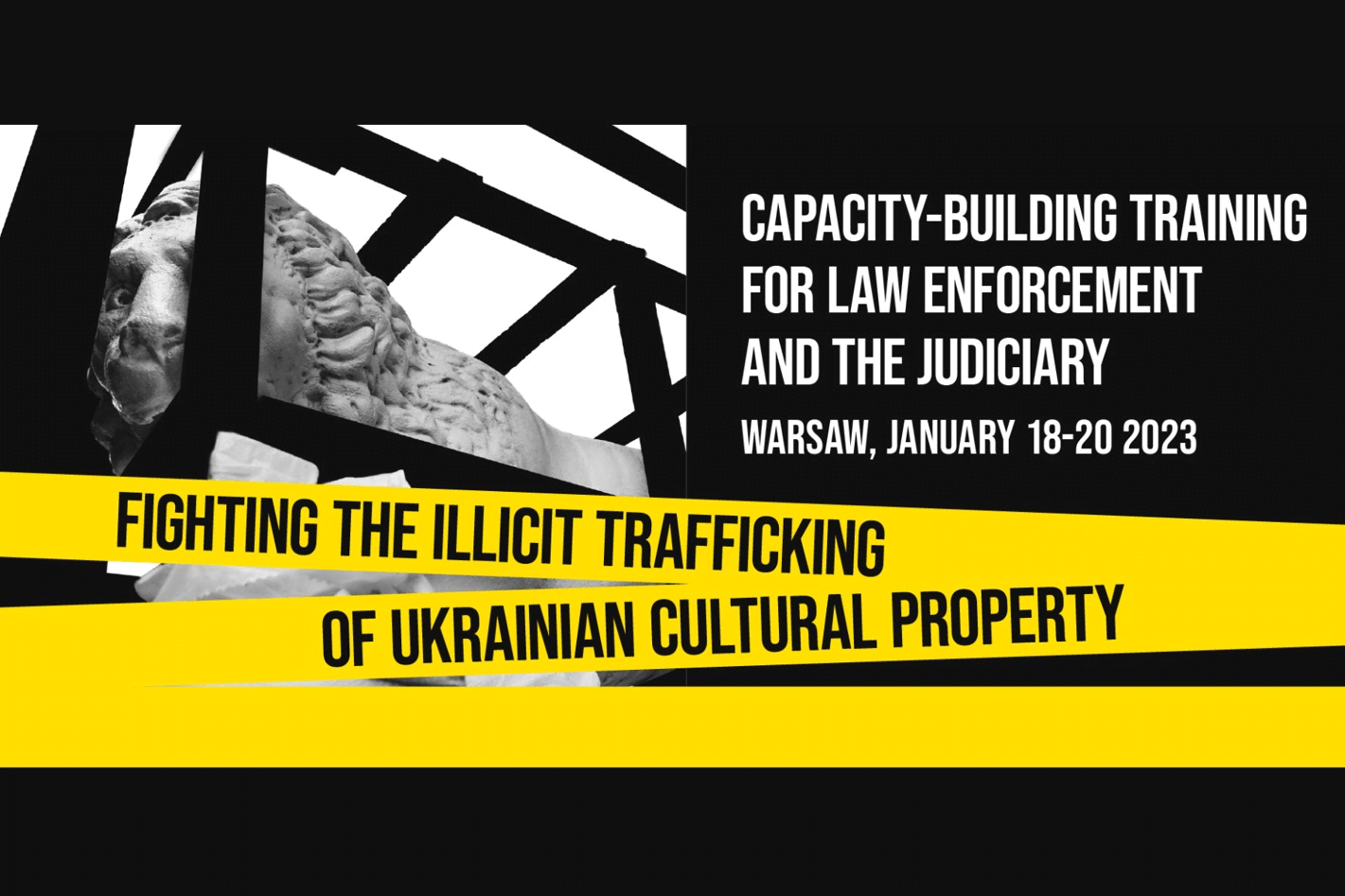A UNESCO workshop session on illegal trafficking and smuggling of cultural goods from Ukraine is underway in Warsaw. Officials, border guards, and customs officers from countries bordering Ukraine – Poland, Slovakia, Hungary, Romania, and Moldova – are participating in the training; Ukrainian specialists and representatives of Polish institutions combating the illegal trade in artworks will act as speakers.
On 18-20 January 2023 in Warsaw, the National Institute of Cultural Heritage – in cooperation with UNESCO – is organising a workshop entitled ‘Fighting the illicit trafficking of Ukrainian cultural property: capacity-building training for law enforcement.’
The inauguration of the three-day workshop was attended by the Deputy Prime Minister, Minister of Culture and National Heritage, Professor Piotr Glinski, UNESCO Director for Culture and Emergencies Krista Pikkat, Counsellor of the Embassy of Ukraine in the Republic of Poland, Vitalii Bilyi, and Director of the National Institute of Cultural Heritage, Dr Katarzyna Zalasińska.
‘One of the threats facing war-ridden Ukraine is the illegal export of, and, more broadly, the illicit trade in movable monuments. Today, thanks to strategic cooperation with UNESCO, we are meeting in Warsaw to jointly face these challenges and find the best way to preserve what is most precious for future generations’ said Deputy Prime Minister Gliński in his opening speech.
The Minister of Culture and National Heritage stressed that the UNESCO initiative, carried out in cooperation with the National Institute of Cultural Heritage, is an opportunity to exchange experiences on counteracting the illegal export of cultural property in the context of the growing threat of smuggling monuments from Ukraine as a result of Russian aggression. He also pointed out that Polish experts using their experience of the country’s post-war reconstruction and the Warsaw Recommendation, developed in 2018, are committed to protecting and saving global cultural heritage.
‘Poland experienced severe losses of cultural heritage in the past century. Today, it is estimated that we lost more than 500 000 works of art during the Second World War due to the attacks by Germany and Soviet Russia. Twenty-two million books are also considered lost. According to the Chief Directorate of the State Archives, around 40 linear kilometres of files were destroyed during the Second World War. Much of this heritage was destroyed and burned after the warfighting ended. This heritage of Polish culture was destroyed on purpose. (…)In the context of the agonising war in the Middle East and the intentional destruction of the centuries-old heritage of Syria, Iraq, or Afghanistan, Poland, in cooperation with UNESCO, organised an international conference on the issue of heritage restoration in 2018. (…) Its result was the adoption of the Warsaw Recommendation on Recovery and Reconstruction of Cultural Heritage, indicating the principles to be followed in the reconstruction of cities, historical quarters, and world heritage sites destroyed as a result of armed conflicts and natural disasters’ stressed Professor Piotr Gliński.
UNESCO Director for Culture and Emergencies Krista Pikkat said that since 24 February 2022, Ukraine’s cultural heritage had been systematically destroyed. At the same time, she reported that UNESCO was working closely with local authorities. It was also monitoring the illegal trade in cultural property.
‘UNESCO monitors, records, and assesses the damage caused to Ukrainian cultural property daily, in close cooperation with the UN agency UNITAR – UNOSAT. (…) We have called on professionals and the public involved in the trade of cultural property to refrain from purchasing or participating in the import, export, or acquisition of ownership titles to cultural property when they have reasonable grounds to believe that the property has been stolen, illegally sold or illegally exported from Ukraine’ said Krista Pikkat of UNESCO.
Officials, border guards, and customs officers from countries bordering Ukraine – Poland, Slovakia, Hungary, Romania, and Moldova – are participating in the UNESCO workshop session. Ukrainian specialists – art historians and archaeologists – will act as speakers and representatives of the National Institute of Cultural Heritage, the Prosecutor’s Office, the Police, the Border Guard, and the National Revenue Administration. Representatives of Interpol, UNESCO, WCO (World Customs Organisation), and ICOM (International Council of Museums) are also taking part in the workshop.
The workshop aims to exchange experiences of border services, customs officers, representatives of state bodies and institutions, and representatives of international organisations in combating illegal export, import, and transfer of ownership of cultural property in connection with the ongoing war in Ukraine.
During the lectures, specialists from Ukraine will present the participants of the workshop with the most characteristic cultural properties forming the heritage of Ukraine, which are currently most vulnerable to the danger of looting and smuggling.

